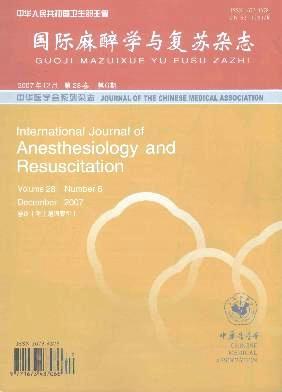Research progress in the clinical application of thoracic paravertebral nerve block in breast cancer surgery
引用次数: 0
Abstract
Breast cancer is the most commonly diagnosed malignant tumor in women. Perioperative anesthesia and analgesia management are closely related to postoperative rehabilitation, and may even be associated with long-term prognosis. The current review summarizes the literature about the effects of thoracic paravertebral nerve block (TPVB) on the perioperative period of breast cancer. TPVB is able to reduce the consumption of opioids and general anesthetics during breast cancer surgery and relieve acute pain after surgery, improve postoperative immunosuppression and tumor microenvironment, and boost anti-tumor potential, which all facilitate rapid rehabilitation. However, the impact of TPVB on the incidence of chronic postsurgical pain (CPSP) requires more researches. Therefore, the application of TPVB in the perioperative period of breast cancer is worthy of promotion. Further investigations are required to explore the impact of TPVB for the long-term prognosis of breast cancer. Key words: Thoracic paravertebral nerve block; Breast cancer; Tumor microenvironment; Long-term prognosis; Chronic postsurgical pain胸椎旁神经阻滞在乳腺癌手术中的临床应用研究进展
癌症是女性最常见的恶性肿瘤。围手术期麻醉和镇痛管理与术后康复密切相关,甚至可能与长期预后有关。本文综述了胸椎旁神经阻滞(TPVB)对癌症围手术期的影响。TPVB能够减少癌症手术中阿片类药物和全身麻醉剂的消耗,缓解术后急性疼痛,改善术后免疫抑制和肿瘤微环境,提高抗肿瘤潜能,有利于快速康复。然而,TPVB对慢性术后疼痛(CPSP)发生率的影响还需要更多的研究。因此,TPVB在癌症围手术期的应用值得推广。需要进一步研究TPVB对癌症长期预后的影响。关键词:胸椎旁神经阻滞;癌症;肿瘤微环境;长期预后;慢性术后疼痛
本文章由计算机程序翻译,如有差异,请以英文原文为准。
求助全文
约1分钟内获得全文
求助全文

 求助内容:
求助内容: 应助结果提醒方式:
应助结果提醒方式:


